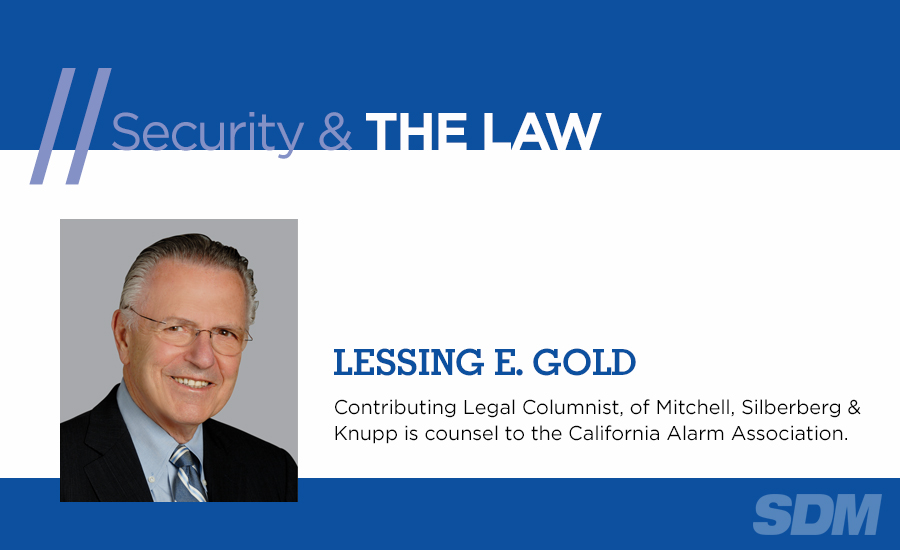Security & the Law
Is Alarm Company Responsible for Plaintiff’s Flood Damage?

A recent action was filed in the United States District Court of Nevada where the plaintiff, owner of a building, entered into a contract with the defendant alarm company’s predecessor for security services at the building, including monitoring alarms and dispatching responses to alarms. The contract was apparently subsequently assigned to the defendant alarm company.
On a Saturday in December 2018, the defendant informed the plaintiff that the fire alarm was triggered in the building. The plaintiff told the defendant to send a dispatch response because no one was available. The defendant reported back that everything was fine at the building. The next day, the same thing occurred. On Monday, the plaintiff discovered the building was flooded and according to remediation service providers, the amount of water was consistent with three days’ worth of flooding.
The plaintiff filed suit, asserting claims for negligence, breach of contract for failing to respond to the two alarms, and breach of the implied covenant of good faith and fair dealing. The defendant moved to dismiss, arguing that the negligence claim is barred by the economic loss doctrine; the contract between the parties limits the damages defendant can recover to 10 percent of the annual service charges or $1,000, whichever is greater; and the claim for breach of the covenant of good faith and fair dealing does not allege a basis that is independent of the breach of contract claim.
Regarding the economic loss claim, the plaintiff claimed it suffered property damage so it was not pursuing purely economic loss. The Supreme Court of Nevada concluded that a defective component of a building does not cause property damage within the meaning of the economic loss doctrine where the component damages only itself and the building of which it is an integral part. Here, even if the fire alarm was considered an integral part of the building, the alarm is not what failed. Instead, the plaintiff alleges it was the defendant’s negligent response to the alarm that caused damage by allowing the flooding to continue unabated for days. The defendant’s response to an alarm is not an integral part of the building such that it could be said the building essentially injured itself. The court therefore denied this portion of the motion.
Regarding the contractual exculpation and limit of liability clauses in the contract, the contract was originally entered into between the plaintiff and a prior security company. The defendant asserts the contract was assigned to them. The court declined to consider this document because the plaintiff disputed that the original contract is the one that governed the relationship between it and the defendant at the time of the events at issue. The plaintiff disputed the authenticity of the contract as being the contract on which its claims are based. The court therefore denied the defendant’s motion to the extent it is based on the provisions of the original 2004 contract.
Regarding the breach of the covenant of good faith and fair dealing, it is well-established that a claim alleging breach cannot be based on the same conduct establishing a separately pled breach of contract claim. The complaint as currently plead alleged the same conduct for the breach of contract claim and the claim for breach of the implied covenant. By alleging that defendant breached the contract by failing to thoroughly respond to the first and second alarms, the complaint fails to adequately allege a breach of the implied covenant. However, the court granted the plaintiff leave to amend its claim because it was not clear that the amendment would be futile.
The court therefore ordered that the defendant’s motion to dismiss be granted as to the claim for breach of the covenant of good faith and fair dealing. The motion to dismiss was denied in all other aspects. It will be interesting to see what happens if the case goes to trial.
READERS ASK
Q: I just received a letter from the city where our alarm company does business. They are requesting me to give them a list of all of my subscribers. Do I have to comply?
A: It is my understanding that many cities throughout the country are attempting to obtain a list of subscribers. This may be mandated by city ordinances. I would not submit a list, however, without an affirming acknowledgement from the city that this list of subscribers will be held confidential and will not be distributed to any party, even under the Freedom of Information Act. Bottom line, do not supply this information unless you absolutely have to.
Looking for a reprint of this article?
From high-res PDFs to custom plaques, order your copy today!





